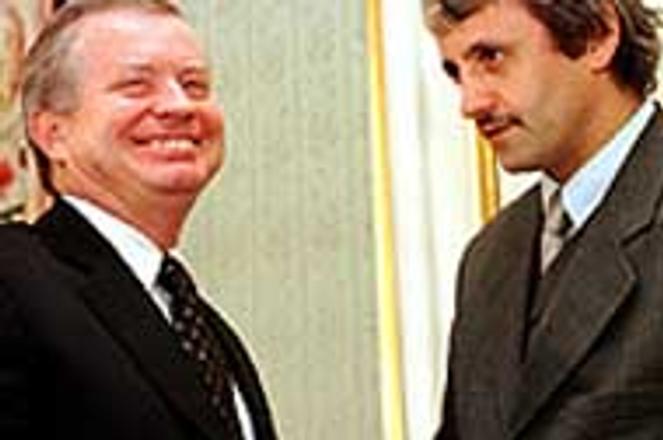Failing Devín banka was dragged back from the abyss by Jozef Migaš (left), head of the coalition SDĽ party, and Prime Minister Mikuláš Dzurinda.photo: TASR
Following the near-collapse of Devín banka and a June 8 cabinet agreement on a 2.5 billion crown government bail-out for the struggling Slovak-Russian financial house, both the state and the National Bank of Slovakia (NBS) have come under fire over what many observers are beginning to see as a banking fiasco.
Deputy Prime Minister for the Economy Ivan Mikloš and Finance Minister Brigita Schmögnerová were forced onto the defensive June 11 as they explained that the action had been taken reluctantly, saying there was little else they could do.
"There was no better solution," Mikloš said. Schmögnerová added that the government had been forced into the move to protect other banks' money, without having to resort to the newly-created Deposit Protection Fund. "There are periods when we have to spend some funds in order not to lose more of them," the minister said.
Following the May collapse of Slovenská kreditná banka (SKB), the third bank crash in the space of 12 months, the central bank declared that commercial banks would contribute a special levy of 0.3% of the average amount of protected deposits in Slovak banks into the Deposit Protection Fund. The fund has been criticised by banking chiefs as an unfair sytem which discriminates against larger successful banks, and has been short of cash after a 1.7 billion crown payoff of protected deposits of another collapsed bank, AG banka.
Devín banka closed 1999 with a net profit of 36.29 million crowns, three million less than in 1998. While its total assets doubled to 13.18 billion crowns over 1999, a large portion of these assets consisted of various claims and debts.
The bank has been a thorn in the side of the present coalition for much of its 18 months in government. The bank again won a controversial tender to unblock Russia's old debt to Slovakia in 1999, but is now facing a penalty from the Finance Ministry for not successfully unblocking all the debt it had promised in previous years.
It has also been accused of being a political lobbying body, with general director Ľubomír Kanis openly supporting the coalition Democratic Left Party (SDĽ) and its continued advocacy of the completion of the third and fourth blocks of the Mochovce nuclear power station in the face of government opposition to the plans. Devín banka had previously mediated a $150 million Russian loan for the construction of the blocks, while the SDĽ nominated Stefan Košovan, a former member of Devín banka's board of directors who still has an ownership interest in the bank, as head of Slovenské elektrárne, the state-owned power monopoly operating Mochovce. Košovan was recalled this March, much to the chagrin of the SDĽ.
Mikloš said that the bank had, from its 1992 establishment, been giving politically motivated loans and had been poorly managed.
The government has conditioned the bridging loan on the participation of the state in the management of the bank. Under the loan terms the Finance Ministry will take one-third of the posts on Devín banka's supervisory board and will have one representative on the board of directors.
Notwithstanding Devín banka's murky past, banking sector chiefs and politicians have hit out at the central bank for the near crash, claiming the Devín banka fiasco highlights what has been a growing trend towards 'soft' banking sector management.
A source in the banking sector, speaking on condition of anonymity, told The Slovak Spectator: "It was clear that Devín banka was in huge trouble right from the beginning. It amassed a huge base of clients by offering high deposit interest rates - this in itself indicated some large problems. But the central bank did nothing."
"I really believe that the central bank is doing nothing in terms of banking supervision. It's absolutely terrible. The first example of this was in 1997 when IRB [Investičná a rozvojová banka, one of the country's largest banks - Ed. note] collapsed. That was three years ago and they had time to learn from that. But they haven't learnt anything. Banking supervision is a complete disaster. The supervision at the moment is hopeless," the source said.
Deputy chairman of the opposition Slovak National Party (SNS) Viliam Oberhauser weighed into the attack on the NBS. He said that the central bank's overseeing of the sector had become very poor and that the state was now being forced to bear the burden of protecting deposits.
But the central bank rejected the criticism. NBS spokesman Ján Onda told The Slovak Spectator: "The NBS considers any criticism concerning the case of Devín banka directed against us as completely unfounded. The NBS has been continuously informed about negotiations between the Finance Ministry and Devín banka."
Onda added: "The governor of the NBS, Marián Jusko, also took part in the recent negotiations with the [Devín] bank management, representatives of shareholders and the Finance Minister. A solution, supported by the NBS, has been suggested that seems to have a good chance of resolving the complicated situation in Devín banka."
The central bank has also been criticised for its performance on monetary policy, and specifically the setting of its inflation targets. NBS officials have openly declared that their priority concern is maintaining a stable crown, leading to questions over commitment to inflation targetting.
Last month the bank made more corrections to its monetary programme for 2000, lowering its headline inflation target to 8.8-9.9%. The move was the third inflation target update in the last five months, undermining, the banking source said, the institution's short and medium-term targets.

